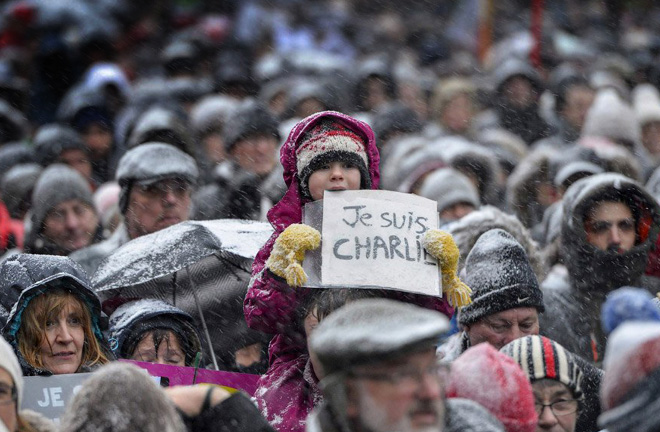Beyond blame

The terror attack on French satirical magazine Charlie Hebdo has shocked the world. Rallies to protest the attack take place all over the world.

People mourn at a funeral for four Jewish men killed in the Paris attack. The funeral was held on Jan. 13 in Israel.
Recently, Paris has witnessed several terrorist attacks. The Charlie Hebdo attack on Jan. 7, in particular, has come as a tremendous shock for France, Europe and all of Western society, attracting close attention from European politicians, academics and media. People have begun to reconsider the position of Muslims in Western society.
The relationship with the Muslim community has long been a heated topic in the West. Western Europe, France and Germany have the largest Muslim populations. In Dresden, Germany, a group called PEGIDA (Patriotic Europeans Against the Islamization of the West) has been organizing anti-“Islamization” rallies since last October.
Now this anti-Muslim sentiment has been exacerbated, generating greater anxiety in Germany. In response, many German citizens participated in rallies in opposition to PEGIDA. In fact, German Chancellor Angela Merkel showed her disapproval of PEGIDA in her New Year’s address, asking citizens to stay away from it.
In the wake of terrorist attacks in Paris, Merkel joined a rally organized by a Muslim community in Berlin, denouncing terrorist attacks as well as the anti-Muslim movement, calling for tolerance and open-mindedness.
“Some violent extremists want to nurture ‘Islamophobia’ and the sense of extremism among Muslims,” said Tariq Ramadan, a professor of Contemporary Islamic Studies in the Faculty of Oriental Studies at Oxford University. Ramadan explained that by waging terrorist attacks, some extremists hope to trigger hostility toward the Muslim community.
The emotional reaction of the Western media will make Muslims feel they do not fit so well into Western society, which is exactly what the extremists desire, Ramadan said. They hope to win more Muslims on their side.
Daoud Kuttab, a former professor of Journalism at Princeton University, also warned against associating Islam with extremism. While Western leaders are correct in pointing out that the fight against terrorist organizations needs to be carried out both in military and ideological sense, Kuttab wrote, we must be aware that conflating Islam and extremism will insult and hurt Islam even if some people and some views can be extremists.
Kuttab’s view echoes with that of Steven Vertovec, director at the Max Planck Institute for the Study of Religious and Ethnic Diversity, who once suggested in his article “Islamophobia and Muslim Recognition in Britain” that the legislation adopted by the West out of hostility against Muslims may further fuel Islamophobia.
In order to facilitate an amiable relationship between Muslims and the Western societies, Ramadan elaborated that politicians need to think about how to nurture a sense of belonging among Muslims. And society needs a more just social, economic and urban policy. For Muslim intellectuals and citizens, they all need to be more vocal, discussing not only the concerns of Islam but also the issues that affect society as a whole.
"We are going through a very difficult and critical time. This is when we need to be not merely apologetic or passive. It is the time for the people who really care about pluralistic society to come and work together.” Ramadan said.
Ramadan continued that there needs to be a revolution of trust and reconciliation. “A revolution of trust means that this is a time for us to come together to work for the right principles, and that this is when we have to be more active and vocal,” he said, “The silent majority should become the vocal majority.”
